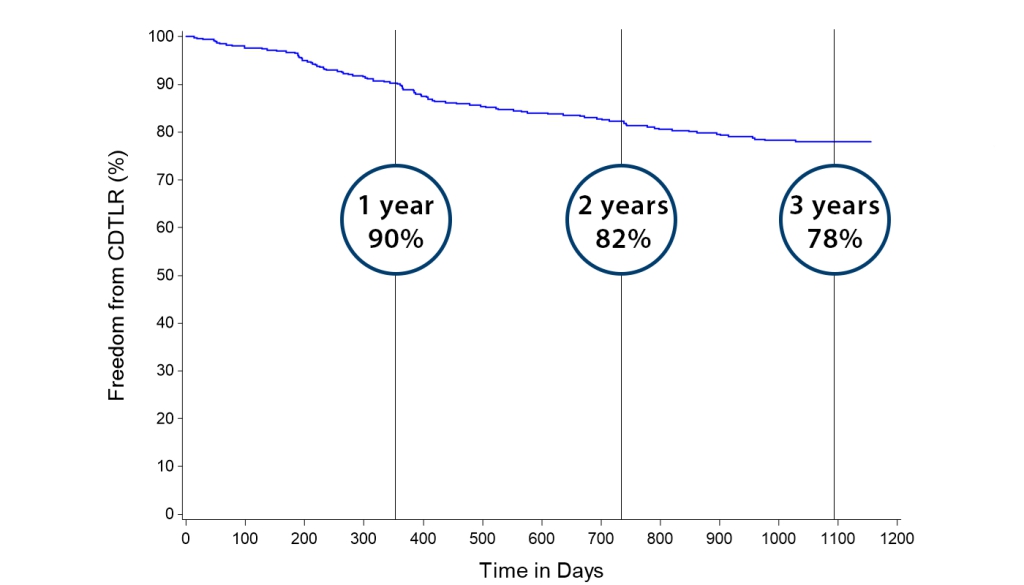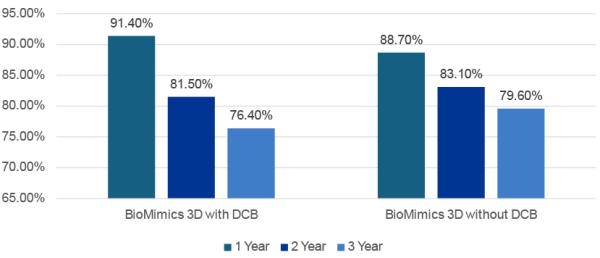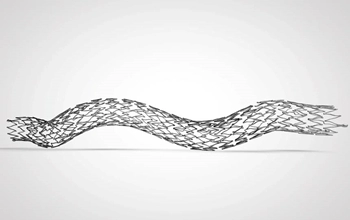MIMICS RCT
A randomised study comparing safety and effectiveness of the BioMimics 3D Vascular Stent
System to a straight stent control.
- PI: Thomas Zeller, MD
- Core laboratories: ultrasound; angiography; X-ray Clinical Event Committee (CEC) adjudication
- 2-year follow up
- 8 German investigational sites
- 76 patients enrolled with a 2:1 randomisation
Baseline Patient Demographics
- BioMimics 3D enrolled population N=50
- Control Stent enrolled population N=26
Gender male – (XX/50)
Gender male – (XX/26)
1.0
Age – Mean years ± SD (N) – 68 ± 10.4
Age – Mean years ± SD (N) – 67 ± 8.9
0.66
Rutherford Category
BioMimics 3D
Control Stent
P value
Rutherford category 1 – (3/50)
Rutherford category 1 – (1/26)
1.00
Rutherford category 2 – (7/50)
Rutherford category 2 – (1/26)
0.74
Rutherford category 3 – (37/50)
Rutherford category 3 – (23/26)
0.27
CLTI – (3/50)
CLTI – (1/26)
1.00
⇒ The majority of patients in both arms were in Rutherford category 3
⇒ There was no statistical difference between the 2 arms
Baseline Procedural Data
Diameter Stenosis – Pre-stent % ± SD 95% ± 8.0
Diameter Stenosis – Post-stent % ± SD 6% ± 8.7
Other Target Lesion Treatments Atherectomy –(39/518)
Other Target Lesion Treatments Drug Coated Ballon – (259/518)
⇒ 50% of the lesions were treated with BioMimics 3D
and Drug Coated Balloon
Baseline Patient Demographics
Stented Segment Length Mean ± SD (mm) 131 ± 80.1
1 stent – (395/518)
2-4 stents – (123/518)
⇒ More than 1 stent used in 25% of lesions
MIMICS-3D European Registry Results
Technical Success (procedure)
Procedural Success
Primary Endpoint – 30-Day Safety (486/493) Freedom from MAE
Primary Endpoint – 12-month Effectiveness (399/448) Freedom from CDTLR
3-Year Results
36-Month KM Freedom from loss of Primary Patency
36-Month KM Freedom from CDTLR
Stent fracture – (3/676)
Kaplan-Meier Freedom from CDTLR over 3 years

Comparison of KM freedom from CDTLR with
and without DCB

⇒ No statistical difference in CDTLR between DCB
and no-DCB cohorts
MIMICS Clinical Program
Enrolling progressively longer and more complex lesions
| Mean ± SD (mm) | MIMICS-RCT | MIMICS-2 | MIMICS-3D |
|---|---|---|---|
| Lesion Length | 66 ± 29 | 81 ± 38 | 126 ± 91 |
| Stented Segment Length | 99 ± 30 | 112 ± 36 | 131 ± 80 |
| CTO | 44% | 30% | 57% |
| Mod/Severe Ca++ | 52% | 46% | 53% |
| CLTI | 6% | 6% | 24% |
Summary
MIMICS-RCT Provided the first clinical proof supporting the durable outcome benefit arising from the BioMimics 3D stent compared to a straight nitinol stent
- Freedom from loss of Primary Patency at 2 years
- 72% for BioMimics 3D vs 55% for straight control stents (P=0.05).
- Freedom from CDTLR
- 91% for BioMimics 3D maintained out to 2 years.
- Core lab X-ray imaging review confirmed 0% stent fractures at 2 years.
- Improvement in Rutherford Category
- 88% of patients treated with BioMimics 3D experienced an improvement of one or more Rutherford category at 2 years vs baseline.
Data on file at Veryan Medical




